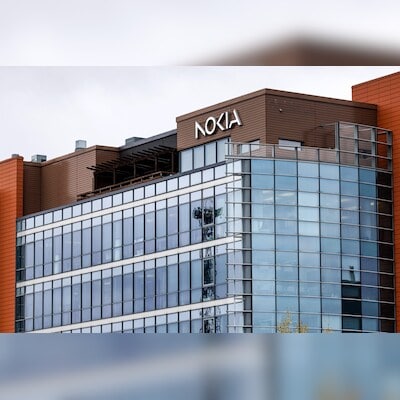)
Nokia jumped 5.1 per cent to €3.98 in Helsinki trading on Thursday. | Photo: Bloomberg
Nokia Oyj’s mobile networks assets are drawing preliminary interest from suitors including Samsung Electronics Co. amid increasing pressure to find new growth in the troubled telecom equipment sector, people with knowledge of the matter said.
The Finnish company has been having discussions with advisers about potential options for its mobile networks business, which has struggled for years to compete with larger rivals like Huawei Technologies Co., the people said. Nokia has considered a number of different scenarios, from selling some or all of the division, to spinning it off or combining with a rival, the people said.
Deliberations are still at an early stage, and there’s no certainty Nokia will decide to pursue any transaction. The entire unit could be valued at roughly $10 billion, the people said, asking not to be identified because the information is private.
Samsung has expressed initial interest in acquiring some Nokia assets as it seeks to gain scale in the radio access networks that connect mobile phones to telecom infrastructure, the people said. Any potential divestments could also attract interest from other rivals, the people said.
Nokia jumped 5.1 per cent to €3.98 in Helsinki trading on Thursday, the biggest share gain since April. The stock has risen 30 per cent this year, giving the company a market value of about €22.3 billion ($24.7 billion).
A representative for Samsung declined to comment. A spokesperson for Nokia said it’s committed to the success of the mobile networks business, which it said is “highly strategic” for the company.
“The business has made significant progress this year both on right-sizing its cost-base while protecting our product roadmap and winning new deals with new customers and increasing share with existing customers,” the spokesperson said. “Nokia is focused on ensuring that Mobile Networks is positioned to serve its customers building the best performing networks, investing in its portfolio and creating value for Nokia’s shareholders.”
Nokia’s mobile networks division supplies base stations, radio technology and servers to wireless operators around the world. It contributed about 44 per cent of Nokia’s total revenue last year, making it the company’s largest segment, according to data compiled by Bloomberg. But the business has been suffering as phone companies, especially in Europe, delay expensive network upgrades.
Nokia, once the world’s leading supplier of mobile phones, ultimately sold off that business after losing market share to Apple Inc. and Samsung. It has since focused on making the equipment for communications networks, including the gear that carries signals for mobile devices.
Western governments have grown increasingly concerned about Huawei’s dominance in the communications equipment sector and the lack of strong rivals. Washington has warned that Beijing could use the Chinese company’s networks for intelligence gathering, as the company has successfully deployed its gear around the world.
Combining Nokia’s mobile networks business with a rival could create a stronger business able to better compete in new technologies. Telecom operators have been frustrated by their limited choice among equipment providers. Best known for its smartphones and memory chips, South Korea-based Samsung is also a competitor in communications equipment, but it has lacked the scale to compete in that business with Huawei and Ericsson AB.
Nokia was hit particularly hard last year when US operator AT&T Inc. announced that it would go with Sweden’s Ericsson as the sole supplier of mobile Open RAN equipment in a deal worth $14 billion. Nokia has been working to diversify its customer base and focus on new areas of growth.
“We are the only company in the world outside of China that is able to deliver all key parts of the network infrastructure that is needed: the core network software, transport network, all the optical connections, and then both fixed broadband and mobile access networks,” Lundmark said in a July interview with CNBC. “There isn’t anybody else.”
The company is seeing growth in its fixed networks division, which sells equipment to support fiber optic and cable technologies. Nokia agreed in June to acquire US-based Infinera for $2.3 billion, taking a significant bet on the artificial intelligence boom.
Infinera was particularly attractive because of its exposure to “server-to-server communications” inside data centers that will be one of the fastest growing parts of the communications technology market, Lundmark said at the time. The deal was Nokia’s biggest since the €10.6 billion takeover of Alcatel-Lucent in 2016.
First Published: Aug 29 2024 | 10:53 PM IST
